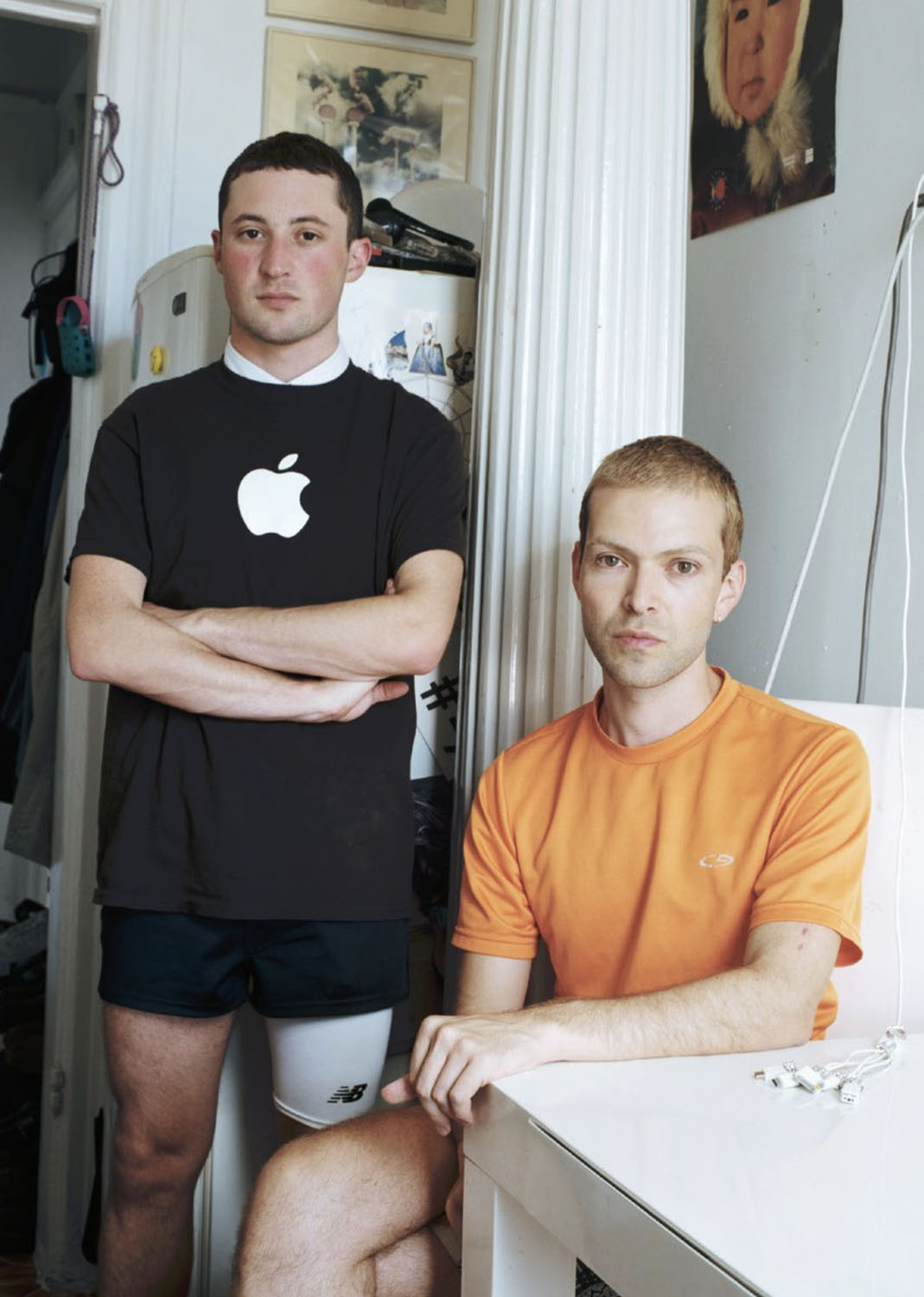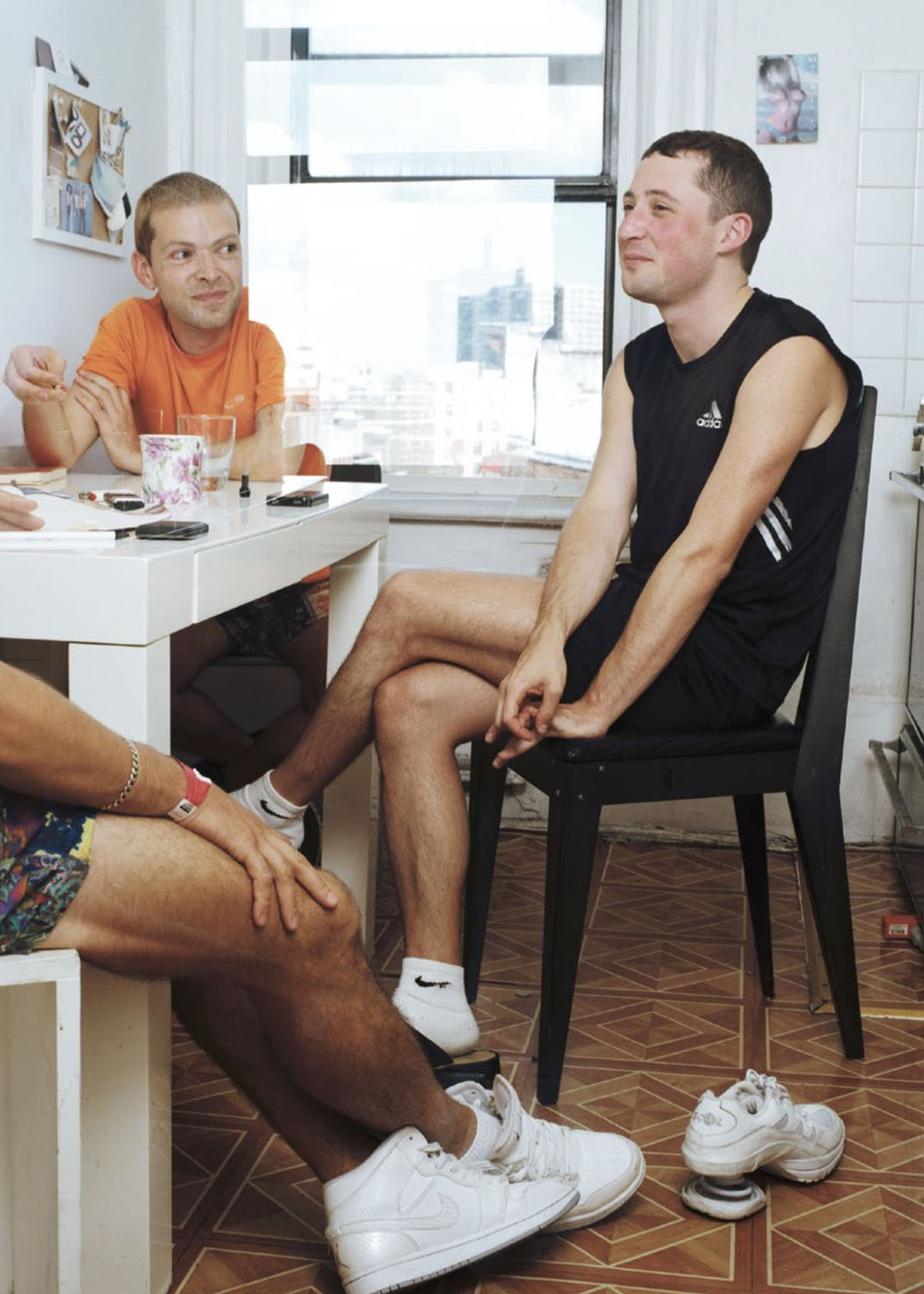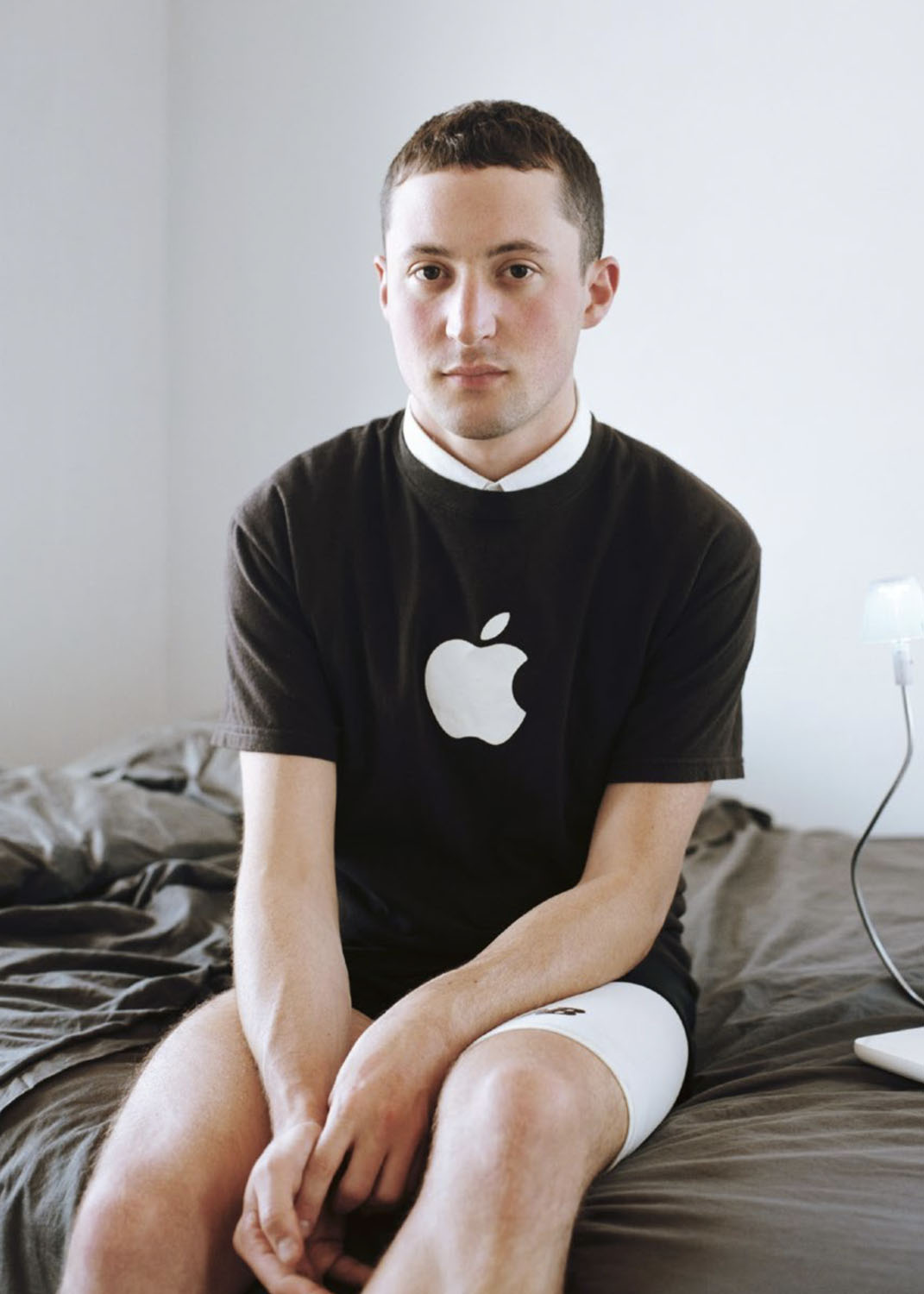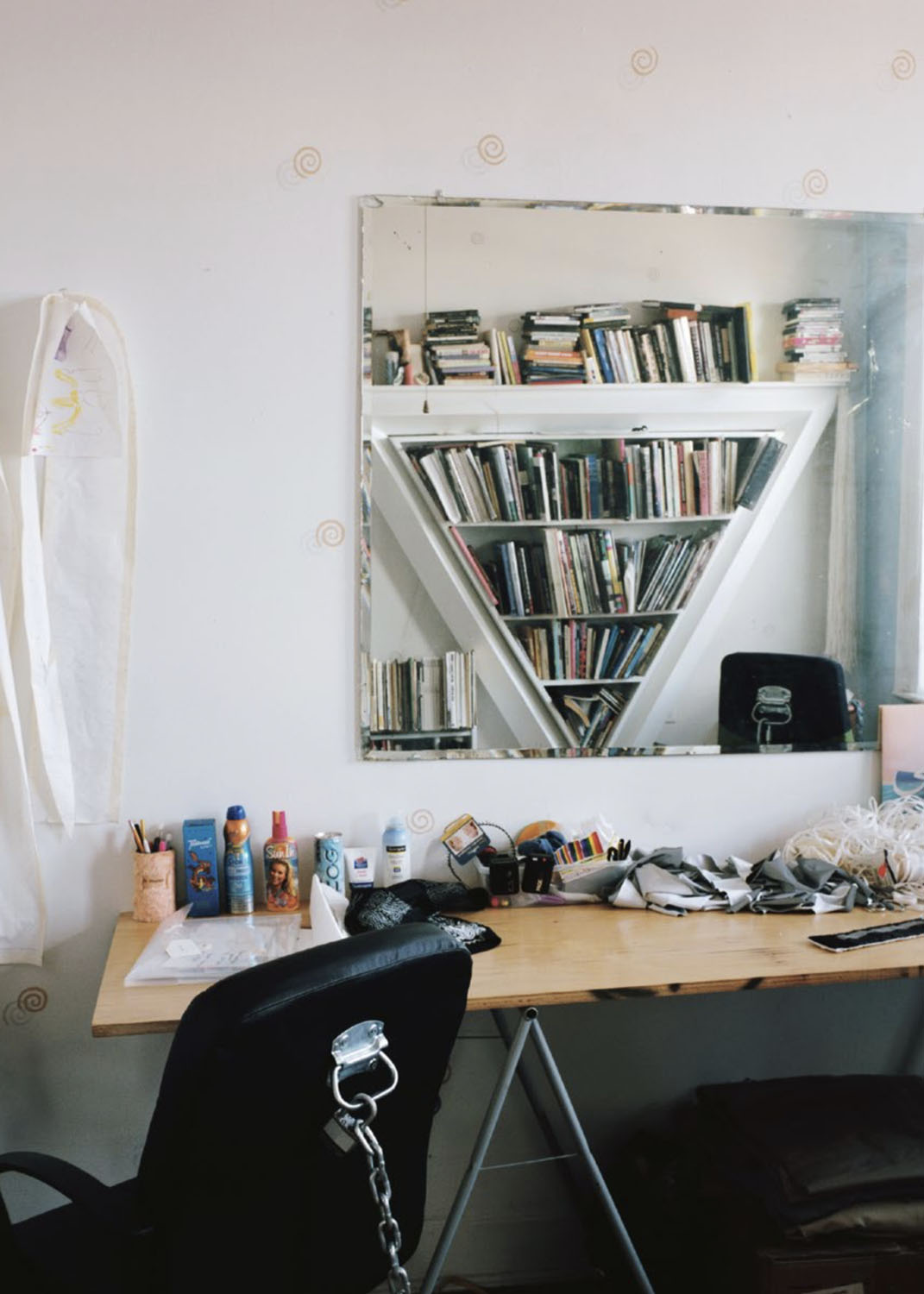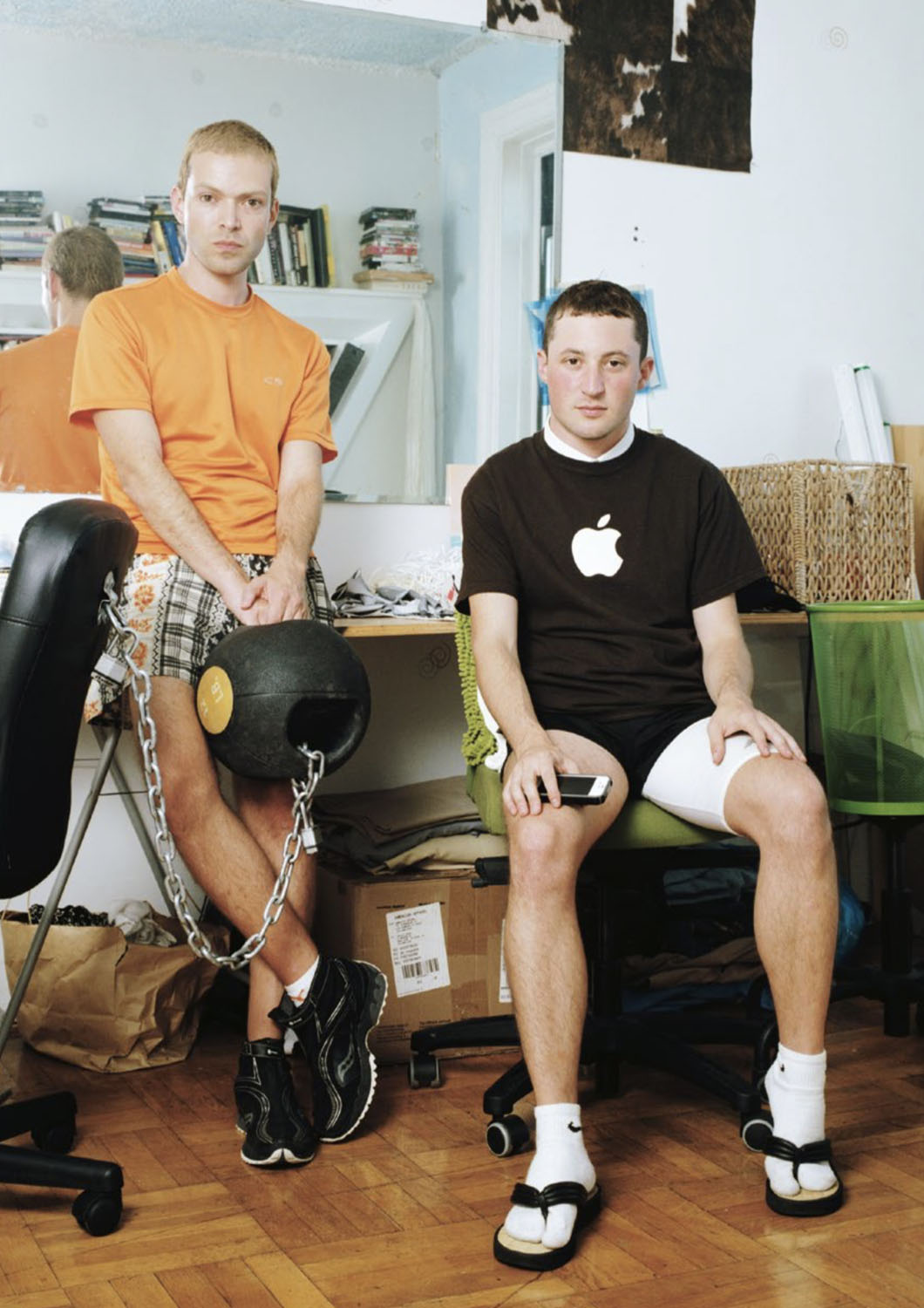SOLOMON CHASE &
DAVID TORO
Interview by Michael Bullock
Photography by Benjamin Fredrickson
Apartamento 10, 2012
David Toro and Solomon Chase are boyfriends, collaborators and two of the founding members/editors of DIS magazine. Since DIS’s launch in 2010 the online magazine has caused a stir, setting forth a definitive new look and editorial position that encapsulates the attitude of a generation that grew up with the Internet. The about section on their site explains: ‘DIS does not distinguish between disciplines nor conform to aesthetic value systems. Their take transcends the dated culture magazine formula of appreciating both high and low culture. From DIS’s internet based viewpoint these hierarchies don’t exists; Kim Kardashian and Marina Abramovic, Fendi and Sketchers are all playing on the same field. All genres and entities are treated with the same respect, as information to be processed. This allows the DIS editors and artists the freedom to mix and combine fashions and trends from far reaching corners of cultures and subcultures that would otherwise never meet. Their perspective is perhaps the most contemporary take on contemporary culture today and has earned them the support of major entities in the worlds of fashion and art. DIS regularly collaborates on projects with MOMA/PS1, and have been invited to create a project for the upcoming Frieze London, and David, Solomon and fellow DIS editor Lauren Boyle were recently appointed as editor’s of Visionaire’s image website Vfiles. They are also planning to leave cyberspace (for the first time) with a Rizzoli retrospective DIS book in the works. So what does the home of the people responsible for a virtual counter culture look like? I head over to their walk-up on Williamsburg’s south side to find out.
Based on the way DIS looks, I was hoping when you opened the door I would walk into a computer rendering of a sleek corporate office.
David: We wish.
Solomon: That’s what we’re saving up for. Actually, I just want a round bed. I’ve wanted one for a long time.
David: Remember when you wanted a small office that was just a bed with a laptop station? We were thinking the sheets would be tucked in really tight. It wouldn’t be like: ‘get into bed’, but more like ‘bed workspace’. Really like an office. Not too comfortable, just casually comfortable.
Can you give me a tour of the place? I notice a lot of Star Trek ephemera.
Solomon: I never really watched the show but I love the aesthetics, especially late Star Trek, like that poster. They have the best ideas for beauty. I have a thousand Star Trek images. I want to do something about how global beauty is ‘intergalactic’ and based around prosthetics. You know how they have all these accessories that are technology-oriented.
Is the triangle bookcase also part of your interest in the Star Trek look?
David: Not really. That was a prop from a Neiman Marcus shoot we were working on. I saved it and made a bookcase out of it.
Solomon: It’s a gay pride bookcase. It doesn’t really work with books.
David: It’s doing exactly what you’re not supposed to do, archiveally. The books are slanted on the side and things are getting fucked up. It’s not necessarily gay pride, but it’s pride. I’ve always been into the black triangle but that means something else. It stands for asocialism, people outside of the norm.
Solomon: This column was Halle Berry’s. That’s what they told us when we bought it.
Where did you get it?
Solomon: That really expensive junk store on Mercer. We knew he was lying, but we didn’t care.
Did you buy it for a shoot?
Solomon: No, we just bought it.
What could add more class to a kitchen than Halle Berry’s column?
Solomon: It’s a good kitchen kind of thing.
David: Our kitchen used to be our favourite spot in the apartment. It was the first thing we decorated.
Solomon: But after that it went to shambles.
David: Everything turned yellow. It’s sad and all the lights don’t work. We just gave up.
What about the sky mural in the office/living room ceiling?
Solomon: We were trying to create a desert theme. We wanted to get lots of giant terracotta pots. We had a few, but most of them broke. It’s really nice to have sky inside.
It’s really nice to have sky inside.
Solomon: Yeah, we like that. And then we also painted terracotta swirlies on the wall. It’s so three-years-ago.
That’s the problem with interiors when you’re a visual person: your space never evolves as fast as you do.
Solomon: This is a box with only white clothing in it. It’s a lot of white clothes.
David: (pointing to a terra cotta pot attached to the base of rolling office chair) Our friend Lizzie Fitch made them. We love them. They’re so weird.
Solomon: We usually put umbrellas in that one. The other we used as a planter, but the plant died. We want to re-plant it but...
David: We haven’t gotten there yet. We’re just into fake plants right now. This is a pile of potential projects... We have this project we’ve been working on, the ‘community do-rag project’. We did it on a small scale last year.
Solomon: That’s an illustration of patterns for do-rags that can interconnect with each other. We were going to try to produce the product, but we haven’t yet.
You wear it together?
Solomon: Yes, This is a two-person do-rag, We shot it for 032c, but we have a design for up to five people.
I wanna wear that in the club! You would never lose your boyfriend!
David: Yeah, it’s really cute.
Solomon: (pointing to an office chair with the fitness ball chained to it) David actually works out with this. It’s an exercise ball.
And your other chair has a purse. It’s accessorising?
Solomon: Yeah, we should keep things in that purse, we don’t actually use it right now. All the furniture in our office is from a temporary gallery installation at Invisible Exports we did last year called DIS HQ (Headquarters). Lizzie did all the interiors. These are all leftovers.
So, you guys prefer office furniture in general?
Solomon: Hmm... I do really wanna get a standing desk. Our friend in L.A., Mary-Ann, has a desk combined with a treadmill. You can walk on it while you’re on the computer.
David: You can put it on a slow setting, so you are able to type and work. Then, you end up walking 20 miles during your workday. Sitting is bad for you so we’re trying to make that happen.
How long have you lived here?
David: Three years
How did you two meet?
Solomon: We met in San Francisco, a long time ago. Actually, the very first time we met David dumped beer all over me. I was very offended. It was mean.
David: It was like a mean crush thing that you do when you’re young. He was wearing extremely short cut-offs and a wind-breaker. I don’t know how old he was, but he looked like a total twink and I thought he would look better wet so I shook up a beer and sprayed it on him.
You made a distinct first impression.
David: I apologised immediately.
Solomon: I was like: ‘whatever’.
David: Then we met a couple years later, for real.
Solomon: I went to Sarah Lawrence. And he was at San Francisco Art Institute. So then we had an LDR.
LDR?
Solomon: A ‘long-distance relationship’ for a year before David moved here.
So how long have you been together?
David: We don’t even know.
Solomon: Six years or something? Three years? Maybe three months?
Did you both study art?
Solomon: I studied literature and art history.
David: I studied photography.
Did you start collaborating as soon as you got together?
Solomon: Yes, we did a line of stick on facial accessories that we sold at Palais de Tokyo and some stores in L.A.
David: They’re in denim and plaid. We also made reflective eyebrows for ‘safety purposes’. We shot them on people rollerblading down Houston. Solomon: Those look really good. You can see them from a car. People wear them.
David: Yeah, they sold. We still sometimes get money from stores in L.A.
What was the impulse to make those?
Solomon: A friend of ours who owns New High Mart in L.A. asked us to make something for the store. We agreed.
When did the idea to start DIS happen?
Solomon: We never had steady jobs until now. Lauren (Boyle) and Marco (Roso) were on unemployment, and so was David, and I was working freelance. Initially we just knew we wanted to start something, but we didn’t know what so we started having meetings.
David: It was a big group of us. We had all these meetings here on Hooper Street, just talking about stuff like the overuse of the word ‘edgy’. I remember having really funny conversations about ‘key words’ and how to not use them, how to replace them. Basically, we were just starting our own vocabulary. We didn’t stick to anything, but we had some good talks about it.
So, the original idea was to create a forum to showcase projects created by your circle of friends?
David: We knew we wanted to create a publication of some kind and it went from print to realising that all of our ideas could more easily exist on the web if we just found right web person. We did a little search, and found Nick (Scholl) our web designer. You know him, the guy with the moustache that also sings opera. He recently moved to Baltimore. He’s such an Internet person that he can live anywhere and it doesn’t matter. Solomon: We were exploring ideas for about a year in a really loose way. Then a lot of people stopped coming to the meetings, till there was just a few of us. Before starting the website we were shooting different things. We wanted to show things a little more negatively than we were seeing in most publications. That was the initial idea.
More negatively?
David: Yeah, in most publications everything is portrayed as ‘amazing’ when most of it is ordinary. I mean, we are into celebrating things, but we wanted to be more critical.
It doesn’t seem at all negative to me. Is that what the name DIS came from?
Solomon & David: No, it was never meant to be a ‘dis’ in the disrespectful sense.
Solomon: We immediately realised that it would be boring being bitchy all the time, so after thinking a lot about the idea of ‘distaste’ we boiled it down to the prefix, a very openended concept that broadened the scope of our platform, and to us was really a frame of mind that encompassed a lot DISciplines. It’s more of a positive alternative.
So at first it was kind of commentary on the advertising/editorial relationship in most fashion and culture magazines, where the publication is paid to recommend its advertisers’ products while pretending they sincerely love what they recommend?
Solomon: Yeah, basically. I think that people forgot how that started. That’s why we wanted to use the editorial format. We wanted to fuck with what that meant.
So you use the seductive selling power of the fashion editorial to sell the reader trends you invented and products that don’t exist. I think you guys perfected using fashion editorial as comedy.
David: We’ve definitely fine-tuned the DIS voice.
Solomon: It’s still referring to mainstream commercialism and sort of celebrating it and it’s somewhat about the future, predicting our future and making it happen. But it’s not really futuristic; it’s kind of ‘ultra-reality’.
It’s a future that is already here, but you and the DIS team enthusiastically embrace it and put a spotlight on it.
Solomon: Yeah, we’re really into new products, products that make your life easier, unnecessary lifestyle products. Like Kush Support. (they pass me a clipping of an ad)
David: You sleep with pad between your breasts to stop them from wrinkling.
Solomon: Yeah, just developing ideas that we want to see happen and trying to depict them.
Like the dog bags?
Solomon: Yes. Now, a lot of other people who have similar inclinations bring ideas to us and we help develop them. Like with the dog bags, that was entirely Ruth Gruca’s vision. She said ‘I’m gonna get all these dog bags, I’m gonna star in it!’
David: It’s funny because in the whole story there’s no mention of her. It’s like she’s the accessory. It’s all about the dogs, going about their day.
How do you feel about the space DIS occupies? It’s in between a few worlds: art, fashion, media, and becoming your own brand with real products.
Solomon: Yeah, we don’t really pay attention to the lines. We like to consider it entertainment and a platform for creative energy and ideas. Definitely, we’ve had more support from art institutions and people in the art world than we have from other areas of culture. We really like the freedom of a digital publication. It’s really malleable. We haven’t ever really been interested in having gallery shows or being in that kind of context so much. We’re not opposed to it, but it’s not what we’re trying to do.
David: Everyone asks us when we’re gonna print it. They assume that we are just waiting until we have enough money, but we really don’t want to do that. The speed and fluidity of the Internet makes sense for us.
Can you describe DIS’s take on fashion?
Solomon: To us, it’s about the sociological aspects. Even in the way that we dress, it’s about blending the codes. A good example is uniforms. I’ve collected uniforms for a long time. Whenever I find say, T-Mobile uniforms, I just buy them all. I also have some from Bank of America, Best Buy, and Home Depot. They hold a lot of meaning in their specific location and they look really good when you take them out of their environment.
David: It’s basically the same idea behind sport clothing. We are obsessed with what we call ‘fake fit’, which is a really Manhattan lifestyle; it’s people wearing yoga pants and fitness clothes with a purse. They’re leaving their house like that, but not actually going to the gym. It’s just comfortable. It’s sort of the new lazy, but you look like you’re really active.
Solomon: They’re really just going to get groceries or some coffee, but they look like they’re on their way to work out or run really far.
David: It looks cute, so it works. I think it’s actually been going on for a while, like the ‘80s had a little of this ‘fake fit’ thing going on, with sweatbands, etc. It’s not really about being athletic, but looking athletic. We like the trend.
You’re really into trends, but also marketing and corporate branding. Typically when artists explore these topics, it’s usually ‘anti’, deconstructing them to expose the systems of control. One of the big differences that DIS presents is a total embrace of all that stuff. It’s like your post the critique of it, using the tools, visuals and language of that world for your own purposes.
Solomon: We definitely celebrate the visual language of that.
You’re sincerely into how that stuff looks?
Solomon: Definitely. We have always exoticised corporate culture. We’ve never worked in that, so we don’t have that intimate relationship with it necessarily, but it’s like...
...a fetishising of corporate culture?
Solomon: Yeah, living in New York, in Manhattan, there’s such intense corporate culture. Everyone is on their way to their corporate job where there offices all look the same. It’s a foreign fantasy for us. We love going to corporate events. We went to this Fruit of the Loom corporate event at their showrooms in Midtown and these women had flown in from Ohio from the head offices. It was the most dry corporate environment: really low standard office ceilings, a murky carpet, the rooms were small, and the drab cotton basics in very diverse sizes were pinned up to a grid structure that lined all of the walls. The showroom was really amazing.
It was to present their new collection?
Solomon: It was. They had new colours, but they were so drab. But they were really excited about them anyway. They held up each pair and explained each new colour.
Were you there as fashion editors?
Solomon: I don’t know how we got invited, but they were definitely not feeling us.
David: We asked them how we could collaborate and they didn’t understand what we meant.
They had probably never heard that word before.
David: They were thinking: ‘Why would we do that?’
Solomon: Anything we’d do wouldn’t appeal to their market. When we were leaving, they refused to give us gift bags.
Companies only want to work with culture magazines if they think they need to capture an ‘edgy’ market. I like that you’re reaching out to companies that have no idea what ‘cool’ is.
Solomon: They have no desire to be cool. Yeah, it’s only companies that are already consider themselves cool that are into collaboration and new types of marketing.
But you have gotten some cooperation.
Solomon: Well some, like Z-Coils. Z-Coils are like the DIS shoe. Only old women wear them, they are so comfortable. You can run in them and your knees never hurt. They are constantly giving us Z-Coils. But we really wanna do a collaboration with a brand like Sketchers.
Have you designed a DIS Z-Coil?
Solomon: We haven’t.
David: We’ve designed a DIS Tory Birch shoe. It’s in the making.
Does Tory Birch know about that?
Solomon: No.
Unwanted collaboration?
Solomon: A lot of unwanted collaborations. But, we go for it anyways. We think we’re collaborating.
